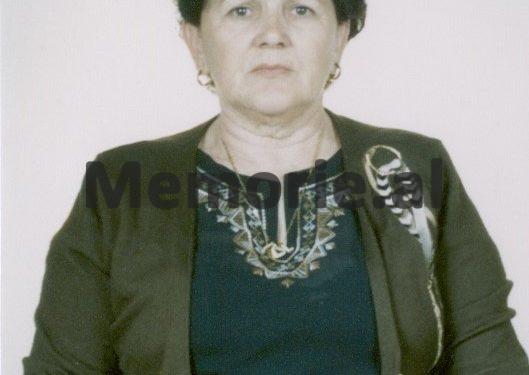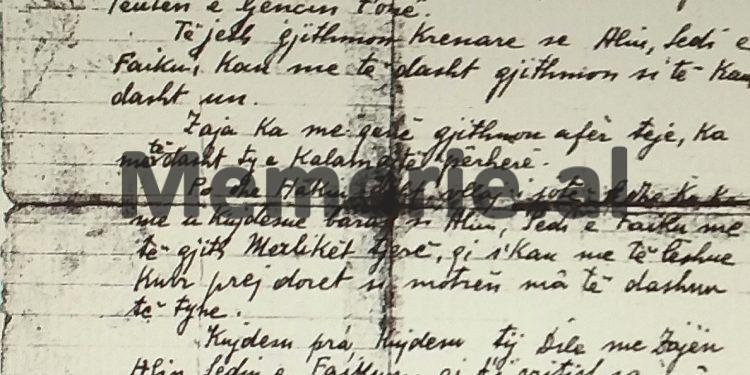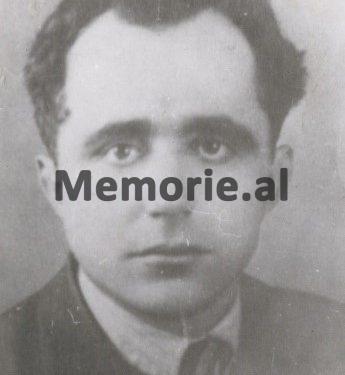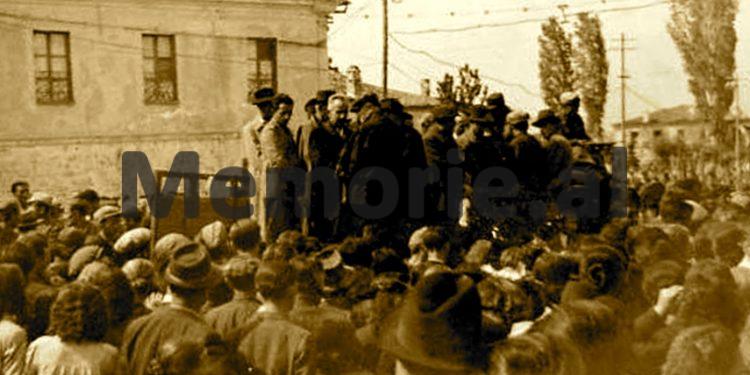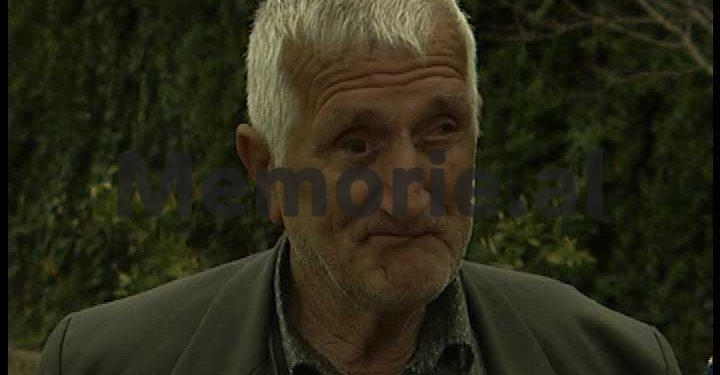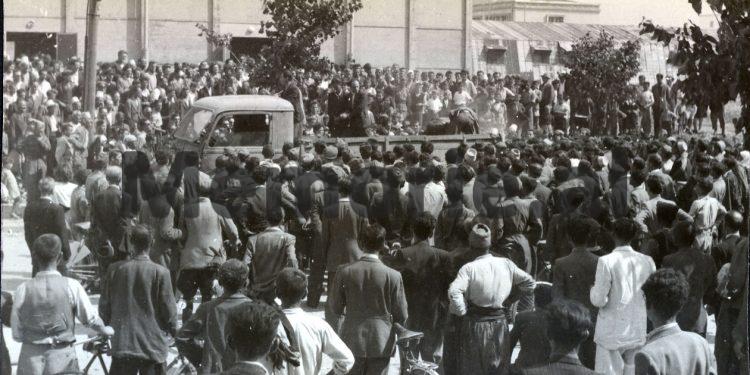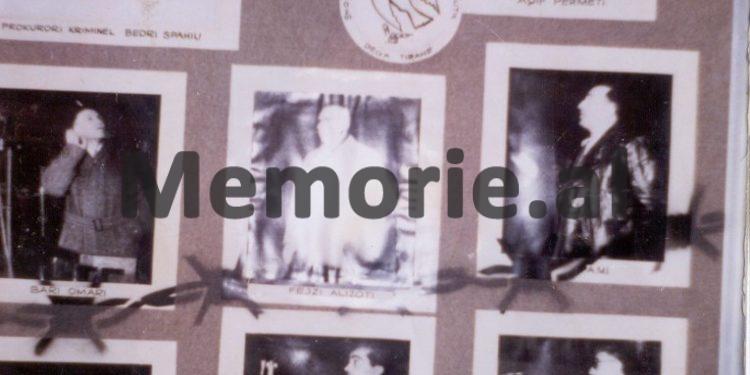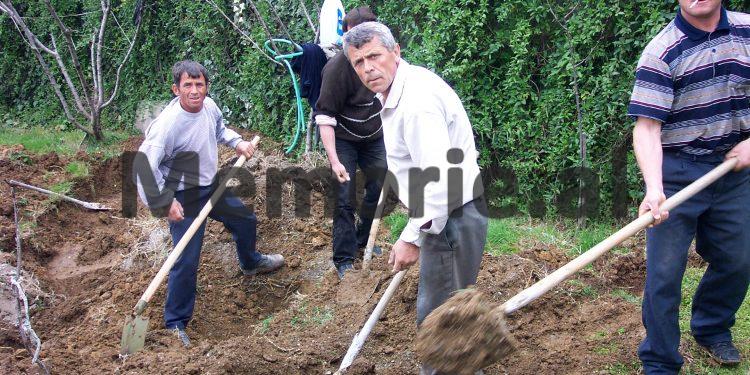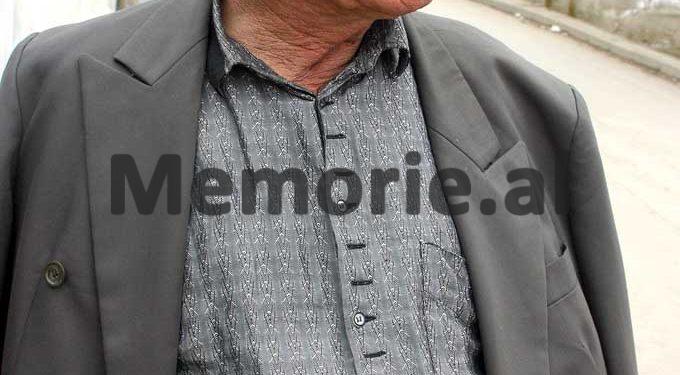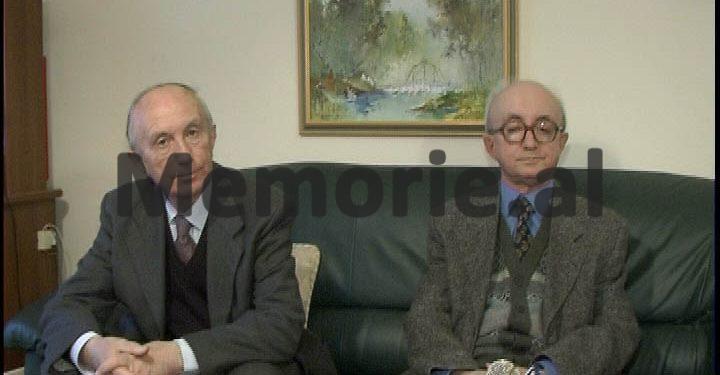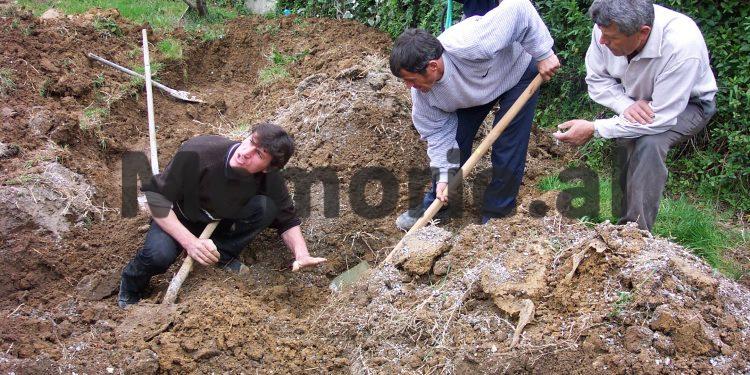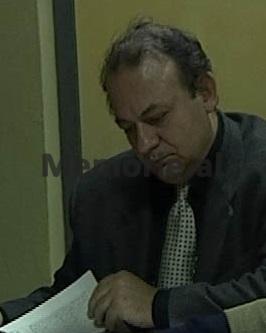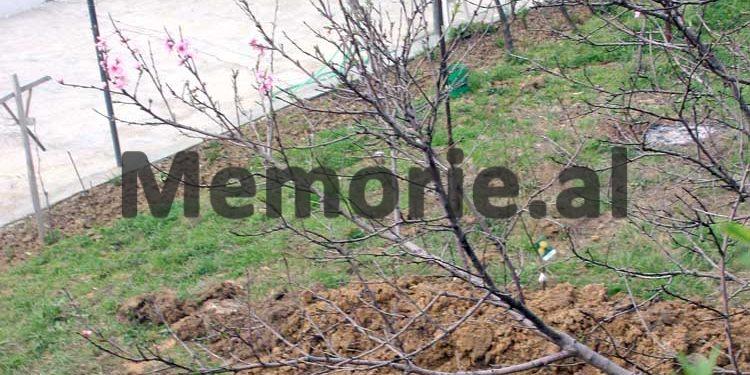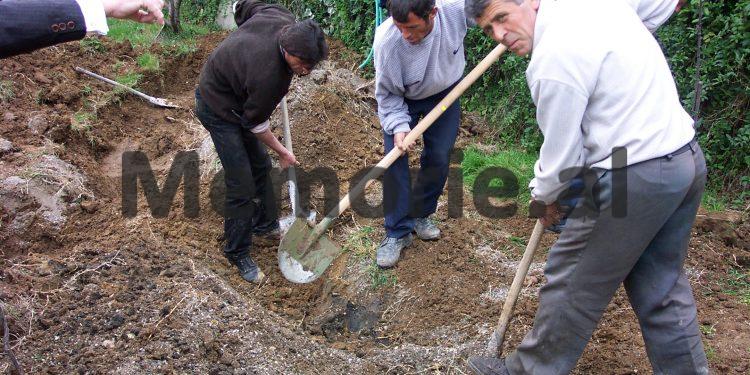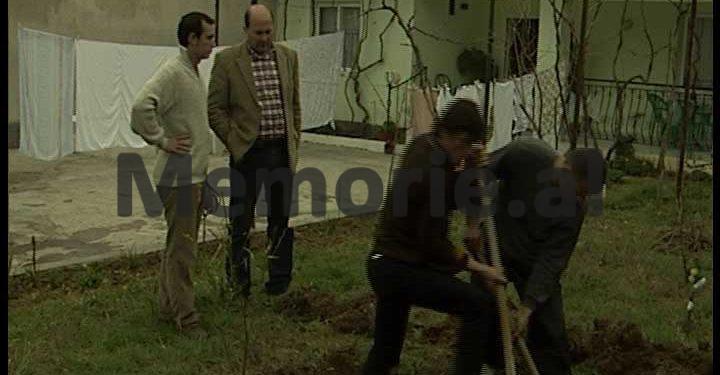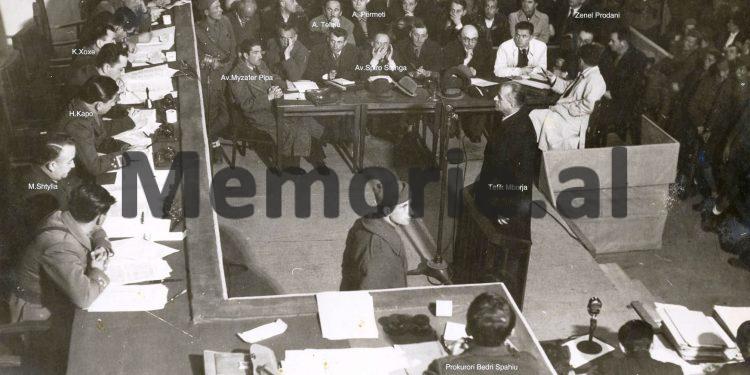Dashnor Kaloçi
Memorie.al publishes the rare testimonies of Mrs. Teuta Merlika, originally from the well-known tribe from the city of Kruja, whose father, Reshiti, was one of the 17 death row inmates at the Special Court held in March 1945, was executed on April 14 of that year. in Kodra e Priftit, somewhere on the outskirts of Tirana, where the bones with the common grave were found in the first week of April 2004, after a persistent work of a group of journalists and employees of “Gazeta Shqiptare” and News 24, with headed by Mr. Carlo Bolino and ing. Nestor Kote, one of the relatives of the 17 gunmen. Who was Reshit Merlika, what were his connections with Prime Minister Mustafa Kruja Merlika, why did he accept the post of fascist federation, why did he not leave Albania and what is said in the letter he sent to his wife on April 12, 1945, only two days before the shooting?
In the first days of April 2004, a group of journalists and employees of “Gazeta Shqiptare” and News24 Television, with the help of the engineer, Nestor Kote (grandson of one of the shooters), made it possible to find the burial place and the remains of the 17 death row inmates in the Special Court held in March 1945, who was executed on April 14 of that year. After the discovery of the common grave in Kodra e Priftit of 17 victims, which was broadcast live by News24 television and was reflected in the chronicles of news editions on almost all television channels of that time, addressed to the editorial office of ” Gazeta Shqiptare ”and News 24, many messages of thanks came from the families of their relatives living in Albania, or abroad. Also, in addition to numerous phone calls and e-mails, some of the relatives of those 17 executed came to our newsroom on their own or received us at their homes to express their appreciation and gratitude to the group of journalists who were engaged and helped uncover that massive tomb. As was Professor Luan Omari with his brother, Fatos, with whom we conducted a long interview for News24 and “Gazeta Shqiptare”. After Mr. Terencio d ”Alena, the 53-year-old colonel living in Rome, whose grandfather, Terenenc Toçi, was one of those 17 unfortunate people who were shot at Kodra e Priftit, Mrs. Teuta Merlika also appeared in our editorial office at that time. who also lived and worked with her family in the Italian city of Foxie. As soon as she met us, she said: “As soon as I heard the news of the discovery of the mass grave on Kodra e Priftit, where my father, Reshit Merlika, is staying, my place was no longer there, so I filled in the documents and came here to thank you. for that noble work you have undertaken ”.
Along with the occasional thanks, Ms. Teuta Merlika also brought us some photos of her father, Reshit Merlika, as well as the original letter he sent from prison to his wife and also to Teuta’s mother, Adiles, just two days before the execution, on April 12, 1945. Yes. who was Reshit Merlika, where did he graduate and what connection did he have with Mustafa Merlika, the famous linguist and politician who accepted the post of Prime Minister of Albania in one of its most difficult periods, that of the fascist occupation ?! What functions did Reshit Merlika have during the occupation in 1939-’44 and why did he not leave Albania, like many other exponents who during the war had been on the opposing side of the communists? What does the letter say that Reshit Merlika sent from prison to his wife, Adile Kovaci, just two days before the execution? How did Merlika’s family learn about the execution site on Priest’s Hill, and how did they manage to open the tomb to receive a mark from the body’s clothes? What was the fate of the family of Reshit Merlika and other members of that well-known Krutan tribe during the communist regime of Enver Hoxha? Regarding these full of events, facts and other stories, Mrs. Tetuta Merlika introduced us, in an interview we received on that occasion, which we are publishing in full in this article.
Ms. Teuta, can you tell us in a few words who your father, Reshit Merlika, was?
My father, Reshit Merlika was born in 1913 in the city of Kruja, where our family originated from. The father also had three brothers, others: Ali, Sejdi and Faiku. Father’s mother, i.e. our grandmother was called Zoje and she was also a daughter from the city of Kruja. After graduating from the seven-year school in the city of Kruja, his father won the right to study to attend classes at the Vlora Business School, which he completed in 1931 with very good results.
What blood relationship did your father have with Mustafa Merlika, the former Prime Minister of Albania during the fascist occupation of the country?
With Mustafa Merlikën, the father was the first cousin, i.e. they both had fathers and brothers. Mustafa Merlika has always been spoken of only badly, but we must keep in mind that he has been a great patriot since the raising of the flag in Vlora in 1912, where he signed together with Ismail Qemali and other delegates, the act of independence. During the Bird Monarchy, Mustafai stayed outside Albania as an anti-Zogist and he returned home in 1939. Thinking that our country would gain independence by taking advantage of the war of major states such as Italy, Germany and Japan, Mustafai accepted the post. of the Prime Minister of Albania, in one of the most difficult periods that our country was going through. In addition to his close friends and associates, Mustafa tried to instill these ideas in the minds of the men of the Merlika tribe. Thus, in this context, my father, Reshiti, during the fascist occupation of the country, agreed to dress as a federal, serving in that position for no more than six months in the cities of Kruja and Durres.
So Mustafa encouraged your father to dress federal?
Given his patriotic past, education and extraordinary authority, Mustafa had a great influence on all the men of the Merlika tribe. When he took over as Albania’s prime minister under Italian occupation, he begged his father to dress as federal, saying, “If we didn’t do that, we wouldn’t be able to tell others.”
But after the capitulation of Italy, what did your father do?
As far as I know from what my mother told me, Adile (Kovaçi) my father worked as a driver with a “Tatra” vehicle.
How and when was your father arrested, Reshiti?
The father was arrested in early 1945 by partisan pursuit forces in the village of Mafsheq, near Qafë-Shtama in the Kruja highlands, which were commanded by Rexh Deliu.
At the end of 1944, when the victory of Enver Hoxha’s partisans was a matter of days, why didn’t your father leave Albania like many others, or more precisely like Mustafa Kruja?
The father did not want to leave Albania because he felt completely clean and had done nothing to kill his conscience. Although he had all the opportunities to leave Albania, he did not leave but stayed quite calm in his house in Kruja. I also wanted to clarify that Mustafa Merlika did not leave Albania to escape the persecution of the communists. In the autumn of 1944, he found Mustafa in Vienna, Austria, where he had gone to treat his son, who later died in one of the city’s hospitals. This is confirmed by the fact that if Mustafai had intended to leave Albania for fear of the communists, he would not have left here all his family members, wife and children.
When did your family learn to shoot your father, Reshit?
Two days before the 17 were executed at Priest’s Hill, the father sent a letter to his mother, telling him not to worry and to take care of the children, as his brothers, Ali, Sejdi and Faik, would they became her brothers too. From what was written there, it was not difficult to understand that he was leaving the last trusts before the shooting. So the father’s mother, Zoja, became interested in the friends of our family and learned that on April 14, 1944, they would be executed on the outskirts of Tirana, on Kodra e Priftit. As my mother told me, the day the 17 of them were sent to be shot was Eid. So that day, Grandma Zoja took my older brother, Gimin, and they went to the Bazaar to buy something for the holiday (since we are Bektashi) and to learn something about the father, according to what they had been told. Coincidentally, as the two of them were crossing one of the streets near the center of Tirana, they saw cars with soldiers and some connected people passing by and became curious to see who they were. In those moments when the cars passed very close to them, the father, Reshti, who was near the spondy, saw them and got to his feet, saying: “Why do you stay on the streets and not go home to celebrate Eid” ?!
What did they do after Reshit’s words?
Zoje sent Gimi to a friend of our family and set off for Kodra e Priftit. She managed to see the whole shooting scene from a place not far away from where she was hiding so that the soldiers would not see her. She stayed there hidden until late at night, and when the soldiers left, she immediately went to her place and dug a hole that was not very deep. She was able to spot our father and her son at the same time, through the clothes he had taken to the old prison a few days earlier. After tearing a piece of his jacket and bloody shirt, she put it in a small bottle where he had previously written his name on a piece of paper. After securing the burial site, Grandma Zoje returned home. Grandma Zoje kept those two clothes of her father as the most expensive thing in life and when she passed away, they took them with them.
After that day, did Our Lady go to that place?
Even after that day she constantly went to that place and came from a bunch of flowers.
How old were you at the time your father was executed?
I was four years old, my older brother, Gimi, was seven years old, and my younger brother, Genci, was less than a year old.
After the father was shot, where did you grow up?
After her father was shot, her grandmother, Zoje, told our mother, Adiles, to return to her parents, as it would be very difficult for her to cope with the life and upbringing of her three young children, due to the surname Merlika. But our mother refused, saying she would stay in that house as long as she lived. So she stayed with Merlikat and raised us, three children, with a hundred worries. Our mother Adilja has been a heroic woman and she has raised us, working on the hardest construction jobs. We were left without schooling, and the “class war” and the weight of the Merlika surname followed us for the rest of our lives, until the fall of the communist regime in 1991.
Apart from your father, were there any other victims of the communist terror from the Merlika tribe?
The Communists behaved in the most barbaric way with the Merlika tribe, shooting ten of them, imprisoning and deporting dozens more. Thus, in addition to our father, they also shot: Sul Merlikën, Sef Merlikën, Mer Merlikën, Man Merlikën, Haxhi Merlikën, etc., whose stories were well known to my brother, Gimi, who passed away a few years ago…
After the ’90s, did you look for the remains of your father’s bones?
“In 1993, my two brothers, Gimi and Genci, went to Kodra e Priftit where they started their research, but that work remained in the middle.
How did you find out about the discovery of the remains of 17 executed people on Kodra e Priftit?
The news of the discovery of the bones was told to me by my daughter on the phone, as I was in Italy, in the city of Foxhia, where I have lived and worked for several years. As soon as I learned that news, it no longer bothered me, and after filling out the documents, I came here to Tirana to thank you as the editorial staff for the very noble work you have done. I have to leave for Italy again, but I will ask you to call me when the reburial ceremony takes place, as I will be coming to Tirana immediately. I hope that we will be allowed to put a bouquet on my father’s grave./Memorie.al




